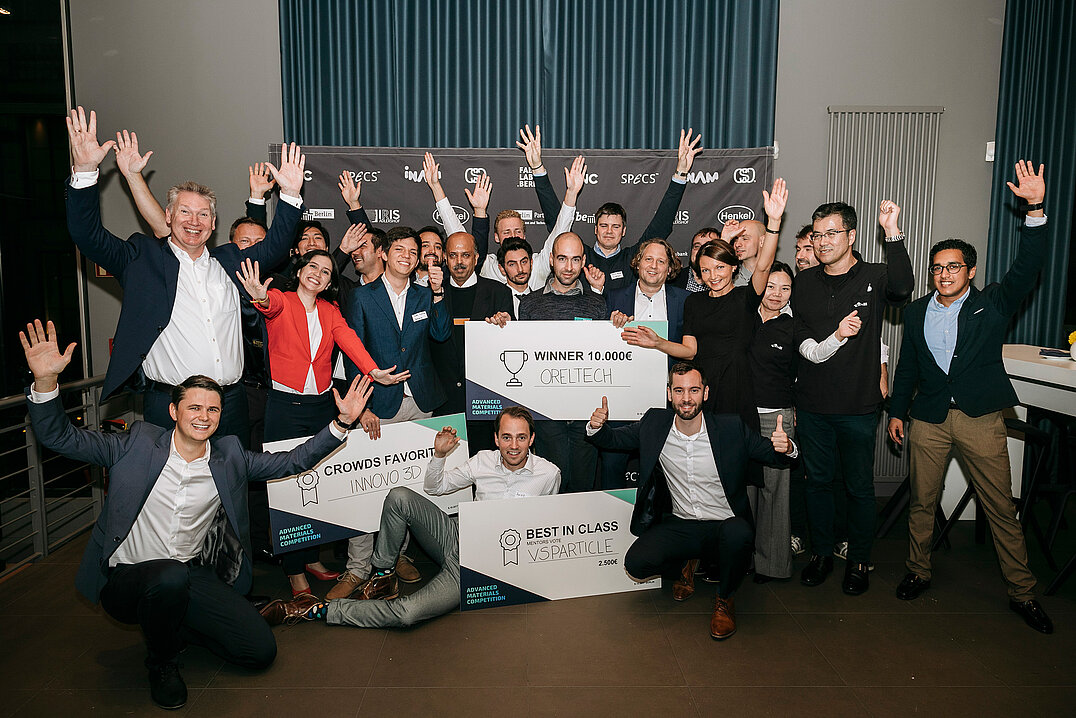Building the electronics of tomorrow
Building the electronics of tomorrow
The second edition of the admacom comprised a fully packed two-week program which saw ten start-ups work, learn, compete, and connect in the German capital of Berlin
Organised for the first time in 2016, the advanced materials competition is a program in which high-tech start-ups spend two weeks in Berlin to accelerate their projects, find potential partners, and make meaningful connections. As it is a competition, a total prize pool of €15.000 was to be won by the participating start-ups. The ‘best in class’ award of €2.500 was won by VSPARTICLE!
Being selected as one of the ten start-ups to participate in the advanced materials competition, VSPARTICLE was surrounded by start-ups in different phases of product development. Although it was a competition, the teams started to help each other from the very beginning. As there is no substitute for experience, this proved to be helpful as all teams could profit from the expertise of the others. The companies’ portfolios ranged from just having a good idea backed up with a couple of experiments, to having a working product ready to be showcased. Excited to take full advantage of the opportunity VSPARTICLE decided to explore the options for using nanoparticles in the field of (micro)electronics at the admacom.
The idea of using nanoparticles to produce electronics stems on potential advantages of the so-called quantum effects. These effects occur when reducing the size of materials below, typically, ten nanometres. In the case of electronics, the most important effect is a significantly depressed melting point, enabling the production of electronics at lower temperatures. This reduces costs as well as strain on substrate materials. Using nanoparticles to produce electronics could mark the start of the transition from conventional 2D production processes to a more flexible 3D bottom-up way of manufacturing electronics. This being said, even the best idea in the world fails if one does not find the right way to use it. This is where participation in the admacom proved to be most valuable.

The program featured presentations, workshops, mentoring sessions, training, networking, and team-building events.
Having little free time in between events it was crucial to be well prepared and work in a structured way. Most teams managed to do so, and were able to connect to potential partners and investors in an efficient manner. As the goal of VSPARTICLE was to build a business case for the use of nanoparticles in electronics, the mentoring sessions proved to be quite helpful. A mentoring session being a 1-on-1 talk of one hour with people having a background in science, business, finance or law. During this hour everything could be discussed, questioned, presented, and asked. Sparring with over fifteen people in this way, and many more over the course of the two weeks, an ever clearer and robust plan was formed. Over the course of the program all start-ups received training for pitching. This being important as at the last day of admacom, every start-up was to give a five-minute pitch on the so called ‘Demo Day’.
When Demo Day arrived, VSPARTICLE was hoping to end the competition on a high. This proved to be the case as VSPARTICLE won the €2.500 ‘best-in-class’ prize. Being graded highest by the mentors on factors such as preparation, presentation and communication, the mentors rated VSPARTICLE as likely to succeed. After having been congratulated for winning the prize, and socializing with the attendees, it was time to head back to the hotel.
We came to Berlin with the idea of using nanoparticles in electronics. After completing the program, we had a much more clear-cut view on how this could be achieved with the means at our disposal.
We flew back satisfied, with new energy to modernise the electronics industry.
Comments
No Comments